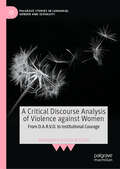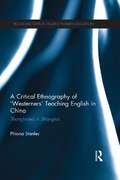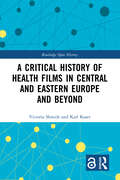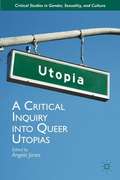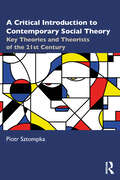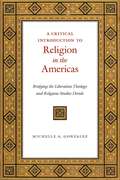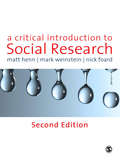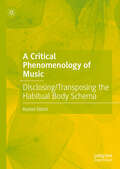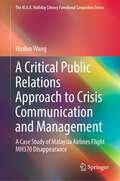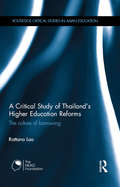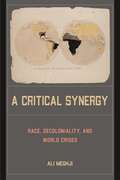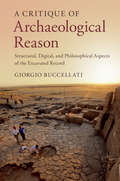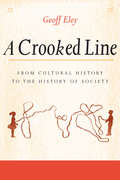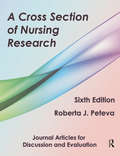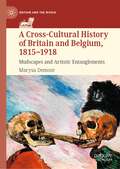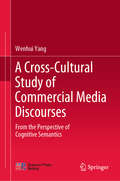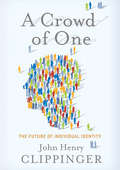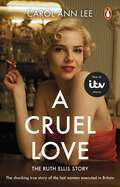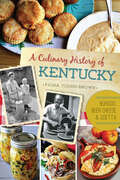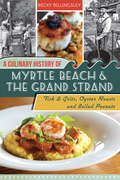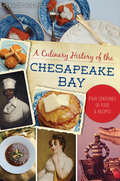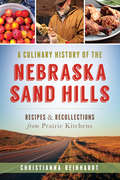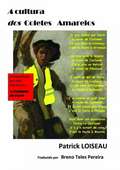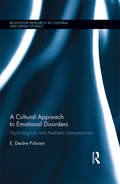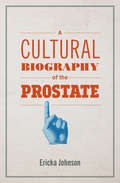- Table View
- List View
A Critical Discourse Analysis of Violence against Women: From D.A.R.V.O. to Institutional Courage (Palgrave Studies in Language, Gender and Sexuality)
by Giuseppina Scotto di CarloThis book presents a critical analysis of the language surrounding Violence against Women and Girls (VAWG), demonstrating how discourse can both sustain harm and serve as a catalyst for healing and change. Grounded in Critical Discourse Analysis (CDA), it examines the &“DARVO&” tactic—Deny, Attack, Reverse Victim and Offender (Freyd, 1997)—a manipulative strategy used by perpetrators to evade accountability, silence survivors, and reinforce a culture of victim-blaming. Through detailed case studies, the book uncovers the broader societal structures that enable and normalise these behaviours. To counteract these harmful dynamics, the author introduces the concept of &“institutional courage&” (Freyd, 1997), providing a framework for institutions to respond more effectively and empathetically to VAWG. Ultimately, the book advocates for a shift in both individual and institutional responses, urging a collective commitment to challenge DARVO and adopt institutional courage in the fight against VAWG. This work will be of particular interest to scholars, practitioners, and students across Linguistics, Women&’s and Gender Studies, Sociology, and Institutional Discourse.
A Critical Ethnography of 'Westerners' Teaching English in China: Shanghaied in Shanghai (Routledge Critical Studies in Asian Education)
by Phiona StanleyTens of thousands of Western ‘teachers’, many of whom would not be considered teachers elsewhere, are employed to teach English in public and private education in China. Little has previously been known, except anecdotally, about their experiences, about the effect they have on education in the context, or on students’ perceptions of ‘the West’ that result from this contact. This book is an ethnographic study of Westerners’ lived experiences teaching English in Shanghai, China. It is based on three years of groundbreaking research into the pre-service training, classroom practices, personal identities and motives, and local socially constructed roles of a group of ‘backpacker teachers’ from the UK, the USA and Canada. It is a study that goes beyond the classroom, addressing broader questions about the sociology, and politics, of transnational education and China’s evolving relationship with the outside world.
A Critical History of Health Films in Central and Eastern Europe and Beyond (Routledge Open History)
by Victoria Shmidt Karl KaserThe burgeoning scholarship on Western health films stands in stark contrast to the vacuum in the historical conceptualization of Eastern European films. This book develops a nonlinear historical model that revises their unique role in the inception of national cinematography and establishing supranational health security. Readers witness the revelation of an unknown history concerning how the health films produced in Eastern European countries not only adopted Western patterns of propaganda but actively participated in its formation, especially with regard to those considered “others”: Women and the populations of the periphery. The authors elaborate on the long “echo” of the discursive practices introduced by health films within public health propaganda, as well as the attempts to negate and deconstruct such practices by rebellious filmmakers. A wide range of methods, including the analysis of the sociological biographies of filmmakers, the historical reconstruction of public campaigns against diseases and an investigation into the production of health films, contextualizes these films along a multifaceted continuum stretching between the adaptation of global patterns and the cultivation of national authenticities. The book is aimed at those who study the history of film, the history of public health, Central and Eastern European countries and global history.
A Critical Inquiry Into Queer Utopias
by Angela JonesThis anthology is a symposium on queer space and queer utopias. Through the presentation of empirical work by contemporary queer theorists this book aims to create a critical dialogue about the emergence of queer spaces and the ways in which they aim to further queer futurity.
A Critical Introduction to Contemporary Social Theory: Key Theories and Theorists of the 21st Century
by Piotr SztompkaExamining the core sociological theories that have emerged in the first two decades of the current century, A Critical Introduction to Contemporary Social Theory outlines their attempts to answer the most fundamental questions of the discipline, from the nature of social order to the mechanisms of social change. Through a careful exploration of the history of modern social theory, Piotr Sztompka lays the critical groundwork for investigating the development of contemporary social theory from its founding fathers in the 19th century, through the rich contributions of the 20th century, known as "the golden age of theory," up to the most recent developments and illuminates how it is both anchored in and a critique of previous attempts to theorize foundational questions to social being and action. Contemporary theory, the book argues, is now moving toward analysis of action, interpersonal relations, social and epistemological realism, and multivalent mechanisms at the root of social phenomenon.Major social theoretical thinkers like Anthony Giddens, Pierre Bourdieu, Jeffrey Alexander, Randall Collins, Jonathan Turner, Hans Joas, Ulrich Beck, Erving Goffman, and others are presented and evaluated as significant contributors to contemporary social theory, while pointing toward future possibilities for social theory in the current century. This will be a key resource for undergraduate and graduate students in sociology, social theory, and contemporary cultural studies.
A Critical Introduction to Religion in the Americas: Bridging the Liberation Theology and Religious Studies Divide
by Michelle A. GonzalezA Critical Introduction to Religion inthe Americas arguesthat we cannot understand religion in the Americas without understanding itsmarginalized communities. Despite frequently voiced doubts among religiousstudies scholars, it makes the case that theology, and particularly liberationtheology, is still useful, but it must be reframed to attend to the ways inwhich religion is actually experienced on the ground. That is, a liberationtheology that assumes a need to work on behalf of the poor can seem out oftouch with a population experiencing huge Pentecostal and Charismatic growth,where the focus is not on inequality or social action but on individualrelationships with the divine.Bydrawing on a combination of historical and ethnographic sources, this volume providesa basic introduction to the study of religion and theology in the Latino/a,Black, and Latin American contexts, and then shows how theology can be reframedto better speak to the concerns of both religious studies and the real peoplethe theologians' work is meant to represent. Informed bythe dialogue partners explored throughout the text, this volume presents ahemispheric approach to discussing lived religious movements. While notdismissive of liberation theologies, this approach is critical of their pastand offers challenges to their future as well as suggestions for preventingtheir untimely demise. It is clear that the liberation theologies of tomorrowcannot look like the liberation theologies of today.
A Critical Introduction to Social Research
by Mr Nick Foard Dr Mark Weinstein Matt HennA Critical Introduction to Social Research is the new, updated and improved edition of A Short Introduction to Social Research. This book introduces students and researchers to the key ideas and issues that inform research practice. In it, Henn, Weinstein and Foard provide a clear and easy-to-understand route-map to help the reader plan their research project from beginning to end. A Critical Introduction is perfect for use on introductory methods courses and is also an invaluable guide for the first time researcher embarking on their own small-scale research project. This new second edition now features updated chapters which reflect recent debates and developments in the field, including: - New coverage of emancipatory and feminist approaches; - Comparative research methods, evaluation research, and action research; - Online research; - Glossary of key terms; - Revised further reading sections at the end of each chapter which include peer-reviewed research articles. This book aims to prepare students and new researchers for their research project. Brilliantly written throughout, this is your essential guide to the theory of research, the practice of research and the best ways to plan and manage your research.
A Critical Phenomenology of Music: Disclosing/Transposing the Habitual Body Schema
by Rachel ElliottDrawing a link between music and what Maurice Merleau-Ponty calls the habit body – a quasi-transcendental structure at the heart of our perceptual, social, and agential being – this book helps articulate why music has the power to express as well as shape our existence at a fundamental level. Using phenomenology, research in the cognitive sciences, and first-person descriptions of musical experiences, this book addresses topics such as the relationship of music to identity, the capacity of music to be personally and socially transformative, the role of music in our perception of others, the connection between music and trauma, and the possibility of engendering we-experiences through shared musical time.
A Critical Public Relations Approach to Crisis Communication and Management: A Case Study of Malaysia Airlines Flight MH370 Disappearance (The M.A.K. Halliday Library Functional Linguistics Series)
by Huabin WangThis book proposes a critical public relations approach to analyzing crisis communication with Malaysia Airlines flight 370 (MH370) disappearance (2014-2018) as a case study. It examines the discursive process of Malaysia’s crisis response and image building, tracing Malaysia Airlines during the immediate response and the Malaysian establishment until the official suspension of the underwater search. The study features a critical discourse analysis of 84 national media texts and 85 response statements, focusing on three aspects: the national media representations of Malaysia’s image, the national carrier and the government’s rhetorical strategies of delivering stances and actions, and the dynamic process of image reconstruction and national recovery. The present project contributes to the current research area by integrating both linguistic and public relations perspectives, and more importantly, by highlighting the ideological impact instead of merely behavioral effectiveness in modern communication research. Target readers may find their interest in corporate crisis communication, critical inquiry about political public relations, and the MH370 incident in general.
A Critical Study of Thailand's Higher Education Reforms: The culture of borrowing (Routledge Critical Studies in Asian Education)
by Rattana LaoThis book offers a critical examination of contemporary higher education reforms in Thailand situated in the broader historical, socio-economic and political changes. Through a qualitative case study with three methods of inquiry, this book explores why different 'global education policies' such quasi-privatisation, internationalization, as quality assessment (QA) have resonated in Thailand higher education sector. Grounded in policy borrowing and lending, this book uses the politics, economics and culture of borrowing to analyse major reforms in Thailand for the past one hundred years. It is argued that historical legacy, policy contexts and belief systems of policy elites play pivotal roles in facilitating policy changes or the lack thereof. While historical analysis elucidates that the Thai state has always been an active borrower of western ideas, the perseverance of the 'Thai-ness' discourse has often been used to suggest its so-called independence and idiosyncrasy. This in-depth analysis of the Thai case aims to contribute to the critical studies in Asian education, comparative higher education, policy borrowing and lending and Thai studies. The Culture of Borrowing intensively studies the policy appropriation in the Thai education system by analysing: • Selective Borrowing and the Historical Development of Thai Higher Education • The Asian Economic Crisis as Window of Opportunity: Autonomous University • Internationalization of Teaching: Quantitative and Qualitative Challenges • The Emergence of Quality Policies and their Rationales • The Intended and Unintended Consequences of Quality Policies This book will appeal to researchers in Education, particularly to scholars studying educational policies within the context of tertiary education. It will also interest scholars specialising in Asian and South-east Asian Studies.
A Critical Synergy: Race, Decoloniality, and World Crises
by Ali MeghjiPractitioners of decolonial theory and critical race theory (CRT) often use one or the other, but not both. In his provocative book, A Critical Synergy, Ali Meghji suggests using the two theories in tandem rather than attempting to hierarchize or synthesize them. Doing so allows for the study of social phenomena in a way that captures their global and historical roots, while acknowledging their local, national, and contemporary particularities. The differences between decolonial thought and CRT, Meghji insists, does not necessarily imply one approach is stronger. Rather, he asserts, they often provide alternative but not incompatible viewpoints of the same social problem. Meghji presents case studies of capitalism, the COVID-19 pandemic, climate crisis, and twenty-first-century far-right populism to show that with both theories, we can understand more, as insights may be lost by using only one. Meghji is not calling for a universal theoretical synthesis in A Critical Synergy, but rather a practice that can help open sociology and social science to the tradition of pluriversality much more broadly.
A Critique of Archaeological Reason
by Giorgio BuccellatiIn A Critique of Archaeological Reason, Giorgio Buccellati presents a theory of excavation that aims at clarifying the nature of archaeology and its impact on contemporary thought. Integrating epistemological issues with methods of data collection and the role and impact of digital technology on archaeological work, the book explores digital data in order to comprehend its role in shaping meaning and understanding in archaeological excavation. The ability of archaeologists to record in the field, rather than offsite, has fundamentally changed the methods of observation, conceptualization, and interpretation of deposits. Focusing on the role of stratigraphy as the center of archaeological field work, Giorgio Buccellati examines the challenges of interpreting a 'broken tradition'; a civilization for which there are no living carriers today. He uses the site of Urkesh in Syria, where he has worked for decades, as a case study to demonstrate his theory.
A Crooked Line
by Geoff EleyEley (U. of Michigan), a self-described radical historian, looks back on his career as historian, while analyzing the great theoretical and methodological debates that roiled the field since the late 1960s and considering their contributions to and false paths for the field. Running through the narrative is an explicit awareness of the connection of these debates to politics outside the academy. Annotation ©2006 Book News, Inc. , Portland, OR (booknews. com)
A Cross Section of Nursing Research: Journal Articles for Discussion and Evaluation
by Roberta J Peteva• The 39 research articles in this collection illustrate a wide variety of models for both quantitative and qualitative nursing research. •The lines in each article are sequentially numbered, which facilitates classroom discussions by allowing professors and students to pinpoint specific parts of an article. •The articles have been carefully selected for use with students who are just beginning their study of research methods. The difficulty level will challenge but not overwhelm. •Factual Questions at the end of each article draw students’ attention to methodologically important points. •Questions for Discussion request students’ opinions on unique aspects of each article. •Helps instructors avoid copyright infringement problems. The publisher has paid fees to the copyright holders for permission to include the research articles in this book. • New to this edition: A copy of our Bonus Articles for A Cross Section of Nursing Research booklet is included free of charge. •The research articles are classified under these major headings: •nonexperimental quantitative research•true experimental research•quasi-experimental research•pre-experimental research•qualitative research•combined qualitative and quantitative research•test reliability and validity research•meta analysis.The articles have been drawn from a wide variety of journals such as: •Behavior Modification•Cancer Nursing•Computers in Nursing•Computers, Informatics, Nursing•Health Education & Behavior•Issues in Mental Health Nursing•Journal for Nurses in Staff Development•Journal of Community Health Nursing•Journal of Gerontological Nursing•Journal of Nursing Care Quality•Journal of Pediatric Nursing•Journal of Research in Nursing•Journal of the Society of Pediatric Nurses•Nurse Educator•Nursing Research•Psychological Reports•Public Health Nursing•Rehabilitation Nursing•Research in Nursing & Health•The Journal of Nursing Administration•Western Journal of Nursing Research
A Cross-Cultural History of Britain and Belgium, 1815–1918: Mudscapes and Artistic Entanglements (Britain and the World)
by Marysa DemoorThis book highlights the ways in which Britain and Belgium became culturally entangled as a result of their interaction in the period between the Napoleonic Wars and the First World War. In the course of the nineteenth century, the battlefields of Waterloo and Ypres in Belgium became veritable burial grounds for generations of dead British military, indirectly leading to the most intensive ties between the two countries. By exploring this twofold path, the author uncovers a series of cross-influences and creative similarities within the Belgo-British artistic community, and explores the background against which the British national identity was constructed. Revealing unknown links between some of the most famous artists on both sides of the channel, such as D.G. Rossetti and Jan Van Eyck; Christina Rossetti and Fernand Khnopff; John Millais and Pieter Breughel, and Lewis Carroll and Quentin Massys, the book emphasises an artistic cross-fertilisation that can be found within battlefield literature throughout the nineteenth century, including examples from the likes of William M. Thackeray, Frances Trollope and Charlotte Brontë. Providing a rich intercultural history of Belgo-British relations after the battle of Waterloo, this interdisciplinary book will appeal to scholars and students researching history, literature, art and cultural studies.
A Cross-Cultural Study of Commercial Media Discourses: From the Perspective of Cognitive Semantics
by Wenhui YangThis book decodes commercial news discourses from the perspective of cognitive semantics. It attaches considerable importance to the bodily experientialism and linguistic embodiment advocated in discourse analysis and cognitive linguistics and explores the complex yet thought-provoking correlation between overt language and covert cognition by focusing on contrastive analyses of metaphors, image schemas, and stance markers in texts. On the basis of the analyses, the author discusses the linguistic applications, lexical devices and personal experiences, along with their embodied mechanisms, revealing the linguistic strategies, embodied cognitive linguistic actions and constructive thoughts used in media discourses on product promotion, human resources deployment, and commodity problem resolution. In turn, this sheds light on how linguistic selections and cognitive mechanisms are used in composing media news and on how public cognition on certain social and business issues might be framed.The combination of cognitive semantics and commercial discourse analysis offers comprehensive and rewarding insights into the cross-cultural research of both cognitive actions and linguistic behavior reflected in news reports and highlights the correlation between the use of wording and cognitive construction in discourses, which broadens the scope of discourse analysis, cognitive linguistics, applied linguistics, and sociolinguistics. Further, the use of analytical measures and the effective integration of discourse analysis and cognitive semantics lend the book additional analytical authenticity, providing an empirical foundation for cross-cultural communication studies.
A Crowd of One: The Future of Inidvidual Identity
by John HenryGreat leaps forward in scientific understanding have, throughout history, engendered similar leaps forward in how we understand ourselves. Now, the new hybrid disciplines of evolutionary biology and social physics are making the next leap possible-and fundamentally altering our notions of individual identity. If identity is a fact not derived from within the individual, but conferred on an individual by a group, or network, a host of assumptions about how governments work, how conflicts arise and are resolved, and how societies can be coaxed toward good are overturned. John Clippinger brilliantly illuminates how the Enlightenment itself-the high point of individual assertiveness-was a product not just of a few moments of individual inspiration and creativity, but rather of a societal shift that allowed innovation and creativity to flourish. Michelangelo owes quite as much to the circumstances of the Renaissance as the Renaissance does to the work of Michelangelo. Now, the digitalization of society, which affects all of us already, allows new insight into these questions: What does it require for societies, organizations and individuals, to thrive? Who decides who you are? How can happiness be shared and spread? Who can you trust?
A Cruel Love: The shocking true story of Ruth Ellis behind the ITV drama
by Carol Ann LeeSoon to be an ITV drama starring Lucy Boynton, A Cruel Love is the definitive story of Ruth Ellis, the last woman to be executed in Britain. Previously published as A Fine Day for a Hanging.'A forensically researched book that casts a haunting new light on the last woman to be hanged in Britain.' —DAILY MAILIn 1955, former nightclub manageress Ruth Ellis shot her lover, David Blakely, dead. A two-day trial followed, but despite huge public outcry, she was found guilty and sentenced to death. At 28, Ruth became the last woman executed in Britain, her hanging one of the most notorious under prolific hangman Albert Pierrepoint.Carol Ann Lee examines the facts behind the headlines surrounding this infamous case, which many believe led to the dismantling of the death penalty a decade later. Drawing on interviews and in-depth research into the full range of sources, she reveals the woman behind the crime.Previously published as A Fine Day for a Hanging, this is the acclaimed biography that inspired the ITV drama, A Cruel Love – a portrait of 1950s club life in all its seedy glamour, and a tragic true tale of murder, class, love and betrayal.'Wonderful . . . it will become the standard reference on Ruth Ellis' Stewart P. Evans, crime historian
A Culinary History of Kentucky: Burgoo, Beer Cheese, & Goetta (American Palate Ser.)
by Fiona Young-BrownPull up a chair to the kitchen table and enjoy a delicious adventure through the Bluegrass State&’s food history. Kentucky&’s cuisine can be traced back to Cherokee, Irish, Scottish, English and German roots, among others. A typical Kentucky meal might have the standard meat and three, but there are many dishes that can&’t be found anywhere else. Poke sallet, despite its toxic roots and berries, is such a favorite in parts of eastern Kentucky that an annual festival celebrates it. Find recipes for dishes from burgoo to hog to moonshine and frogs. Join author Fiona Young-Brown as she details all the delectable delights sure to make the mouth water.
A Culinary History of Myrtle Beach & the Grand Strand: Fish & Grits, Oyster Roasts and Boiled Peanuts (American Palate)
by Becky BillingsleyThe culinary history of Georgetown and Horry Counties reflects a unique merging of Native American, European, African and Caribbean cuisines. Learn how slaves taught their masters to create vast wealth on rice plantations, what George Washington likely ate when visiting South Carolina in 1791, how the turpentine industry gave rise to a sticky sweet potato cooking method and why locals eagerly anticipate one special time of year when boiled peanuts are at their best. Author Becky Billingsley, a longtime Myrtle Beach-area restaurant journalist, digs deep into historic records, serves up tantalizing personal interviews and dishes on the best local restaurants, where many delicious farm-to-table heritage foods can still be enjoyed.
A Culinary History of the Chesapeake Bay: Four Centuries of Food & Recipes (American Palate)
by Tangie HolifieldThe four hundred years since colonization have brought European, African and Asian techniques, ingredients and tastes to the Chesapeake Bay. European colonists and Africans both enslaved and free were influenced by indigenous ingredients and Native American cooking and created uniquely New World foods. The nineteenth century saw the development of industries based on the bounty of the Bay and the rising popularity of oysters, blue crab and turtle soup throughout the greater Mid-Atlantic. Waves of immigrants brought their own cuisines to the mix, and colcannon, brisket, sauerkraut and fish peppers are now found on Chesapeake tables. Local author, scientist and blogger Tangie Holifield weaves together the unique food traditions of the Bay, telling the stories of each culture that has contributed to its bounty.
A Culinary History of the Nebraska Sand Hills: Recipes & Recollections from Prairie Kitchens (American Palate)
by Christianna ReinhardtSpanning nineteen thousand square miles of central Nebraska, the Sand Hills--North America's largest sand dune--is held in place by only a thin, sturdy layer of native prairie grasses and continuing faith that the land can be made prosperous by its residents. Settlers in the area had to be hardy and resourceful, making use of what the land provided and holding fast when their hard work blew away with the prairie winds. From foraging to ranching, food meant survival, but it also meant community. Staples like fried chicken, biscuits, fruit pies, preserves and cakes all play a role in the fascinating story of the region. Join food writer Christianna Reinhardt as she dishes up the unique and tasty history of this exceptional part of the world.
A Cultura dos Coletes Amarelos: Acompanhado por uma referência a A Comuna de Paris
by Patrick Loiseau"Sim, existe uma cultura dos “coletes amarelos”... Quero dizer que esse movimento nascido do inevitável e (portanto) do imprevisível criou seus cânones culturais, apesar de tudo que se possa culpá-lo: o francês esgarçado, os erros de ortografia, a “violência”, a mistura de valores, etc. Ele pode ter ido além do movimento estudantil e, em seguida, da greve geral de maio-junho e 1968. Vou tentar mostrar isto neste livro, por meio de múltiplos desenhos, caricaturas, fotos, logotipos e slogans, etc. Adicionarei os esclarecimentos necessários sobre o contexto social em um clima recorrente de crise política... Esta pintura, que veste o retrato imperfeito e não exaustivo de uma insurreição, não almeja o enciclopedismo, mas apenas trazer justiça a um movimento que tentou quebrar as correntes da pobreza e derrubar, para além do governo autocrático macroniano, uma sociedade egoísta e cada vez mais ditatorial.
A Cultural Approach to Emotional Disorders: Psychological and Aesthetic Interpretations (Routledge Research in Cultural and Media Studies)
by E. Deidre PribramIn her latest contribution to the growing field of emotion studies, Deidre Pribram makes a compelling argument for why culturalist approaches to the study of emotional "disorders" continue to be eschewed, even as the sociocultural and historical study of mental illness flourishes. The author ties this phenomenon to a tension between two fundamentally different approaches to emotion: an individualist approach, which regards emotions as the property of the individual, whether biologically or psychologically, and a culturalist approach, which regards emotions as collective, social processes with distinctive histories and meanings that work to produce particularized subjects. While she links a strong preference for the individualist construct in Western culture to the rise of the psychological and psychiatric disciplines at the turn of the twentieth century, Pribram also engages with a diverse set of case studies tied to psychological and aesthetic discourses on emotions. These range from Van Gogh’s status as emotionally disordered to the public, emotional aesthetics of 19th century melodrama to the diagnostic categories of the DSMs and the fear of "globalizing" emotional disorders in the 21st century. This genuinely interdisciplinary approach makes for a text with potential application in a wide range of disciplines within cultural studies, including sociocultural and historical analysis of psychiatry and psychology, gender theory, subject and identity theory, popular culture studies, and history and theory of the arts.
A Cultural Biography of the Prostate
by Ericka JohnsonWhat contemporary prostate angst tells us about how we understand masculinity, aging, and sexuality.We are all suffering an acute case of prostate angst. Men worry about their own prostates and those of others close to them; women worry about the prostates of the men they love. The prostate--a gland located directly under the bladder--lurks on the periphery of many men's health issues, but as an object of anxiety it goes beyond the medical, affecting how we understand masculinity, aging, and sexuality. In A Cultural Biography of the Prostate, Ericka Johnson investigates what we think the prostate is and what we use the prostate to think about, examining it in historical, cultural, social, and medical contexts. Johnson shows that our ways of talking about, writing about, imagining, and imaging the prostate are a mess of entangled relationships. She describes current biomedical approaches, reports on the "discovery" of the prostate in the sixteenth century and its later appearance as both medical object and discursive trope, and explores present-day diagnostic practices for benign prostate hyperplasia--which transform a process (urination) into a thing (the prostate). Turning to the most anxiety-provoking prostate worry, prostate cancer, Johnson discusses PSA screening and the vulnerabilities it awakens (or sometimes silences) and then considers the presence of the absent prostate--how the prostate continues to affect lives after it has been removed in the name of health.
